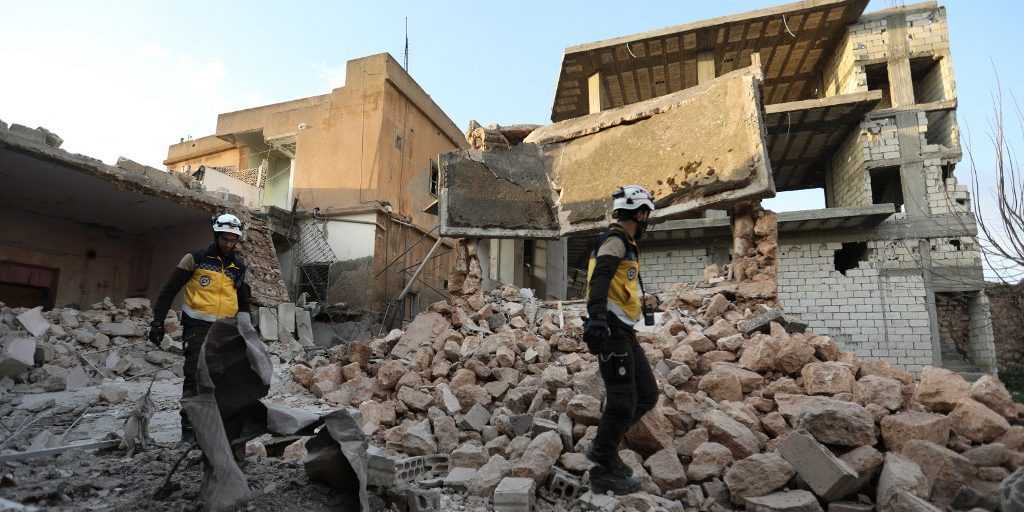Global chemical weapons watchdog strips Syria of its voting rights after repeated violations
On Wednesday, the Organisation for the Prohibition of Chemical Weapons (OPCW) voted to suspend several of Syria’s rights and privileges as a party to the Chemical Weapons Convention. What does this decision mean, and what are the consequences for Syria?
22 April 2021
AMMAN — On Wednesday, the Organisation for the Prohibition of Chemical Weapons (OPCW) voted to suspend several of Syria’s rights and privileges as a party to the Chemical Weapons Convention. What does this decision mean, and what are the consequences for Syria?
What is the OPWC?
The OPCW is the global chemical weapons watchdog. The body is tasked with implementing the international Chemical Weapons Convention, which entered into force in April 1997.
In 2013, the OPCW was awarded the Nobel Peace Prize for its efforts to limit and eliminate chemical weapons worldwide. The organization has verified the destruction of 98% of the chemical weapons stockpiles declared to the organization by member states.
The Chemical Weapons Convention prohibits the use, sale, stockpiling and transfer of chemical weapons and aims for their elimination globally. All state parties to the convention automatically become members of OPCW. Nearly all countries (193 states) are OPCW members.
Syria was pressured to join the OPCW in 2013 following chemical attacks in the suburbs of Damascus that killed at least 1,400 people. The attacks were widely attributed to the regime. To avert the threat of American retaliatory strikes, Syria agreed to join the OPCW and committed to declaring and destroying its chemical weapons stockpile.
Why a motion to remove Syria’s voting rights?
When Syria joined the OPCW in 2013, it committed to declare all of its chemical weapons. OPWC teams were allowed in the country to visit sites and seize the chemical weapons stockpile. In 2016, the destruction of Syria’s chemical armament stocks was declared complete.
However, two reports recently released by the OPCW’s Investigation and Identification Team (ITT), which is tasked since 2018 with investigating chemical weapons in Syria, confirmed that the Syrian regime lied about its stockpile.
A first report, released last year, established that the Syrian regime used sarin gas and chlorine against the village of al-Latamneh in Hama province in March 2017. On April 12, 2021, a second ITT report similarly concluded that the Syrian Arab Air Force dropped a chlorine gas cylinder on Saraqeb in northwestern Syria in February 2018.
The release of the second report only a few days ahead of the second part of the annual OPCW conference contributed to mounting international pressure to sanction Syria.
According to the organization’s regulations, a State Party to the Chemical Weapons Convention cannot be deprived of its OPCW membership. However, the OPWC can take other sanctions against a non-compliant member, including depriving it of its rights under the convention. The OPWC can also issue recommendations of collective punitive measures to be taken by other states. “In cases of particular gravity,” the OPWC can vote to bring the issue to the United Nations General Assembly and the Security Council (UNSC).
On April 20, during the organization’s annual conference, 46 member states introduced a motion to suspend Syria’s voting rights at the OPCW. It is unlikely that bringing the issue to the UNSC will lead to any further sanction, given Russia and China’s veto power.
The decision to sanction a member should, where possible, be taken by consensus – which could not be attained in this case given the overt opposition of Syria’s allies. Following OPWC procedures, the motion was submitted to a vote requiring a majority of two-thirds.
While there are 193 OPCW members, not all members attend the annual conferences and only 136 took part in the vote. The motion passed by a large majority with 87 votes in favor, 34 abstentions and 15 votes against. Unsurprisingly, Syria and its allies, including Russia, China and Iran, voted against the motion.
What are the consequences for Syria?
The consequences of this decision are, first and foremost, symbolic. It is the first time in the OPWC’s history that a member state has received such a sanction.
Multilateral diplomatic efforts on Syria have repeatedly stalled over the past ten years due to the barrage erected at the UN Security Council by Syria’s allies through Russia and China’s veto power. This symbolic victory at the OPWC signals broad consensus among the international community against the Syrian regime, despite the Russian-led blockage of multilateral action at the UN.
Accordingly, several states expressed their satisfaction with the outcome of the vote. “A good day for multilateralism,” said Luis Vassy, the French ambassador to the Netherlands and to the OPWC, who introduced the motion at the conference.
Concretely, Syria has lost its voting power at OPCW meetings and deliberations. It can no longer fill any positions in the OPCW nor be a member of its Executive Council, which carries out executive tasks on behalf of the organization. All member states have the right to serve on the council on a two-year rotational basis.
Unfortunately, this victory at the diplomatic level will have little direct impact on the Syrian victims of chemical weapons use, who are still waiting for justice and accountability. Civil society organizations continue to call for greater pressure on the Syrian regime and support for ongoing judicial initiatives in European jurisdictions.
Three legal initiatives to investigate chemical weapons use by the Syrian regime are ongoing in Germany, France and Sweden. The complaints have been presented by Syrian survivors and civil society organizations, including the Open Society Foundation, Syrian Archive and Syrian Center for Media and Freedom of Expression.







